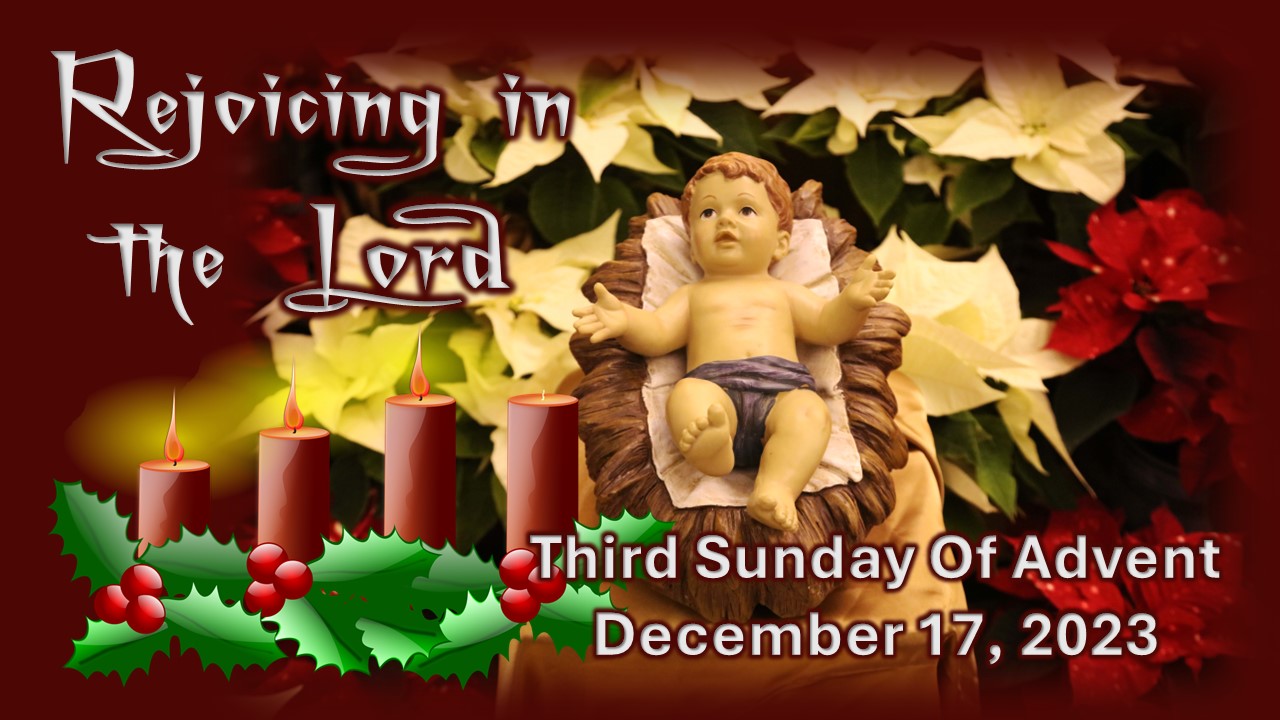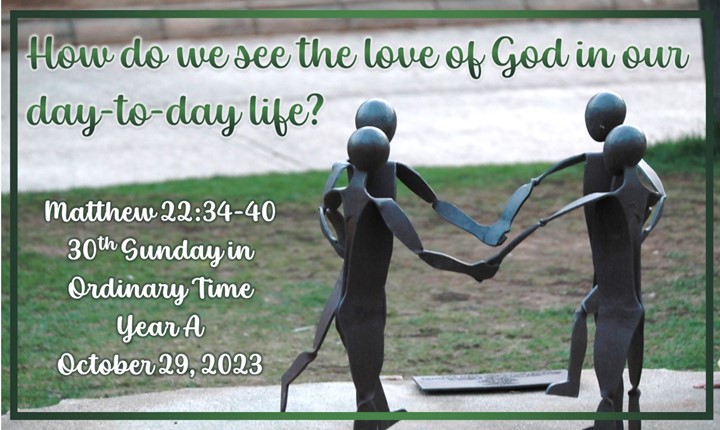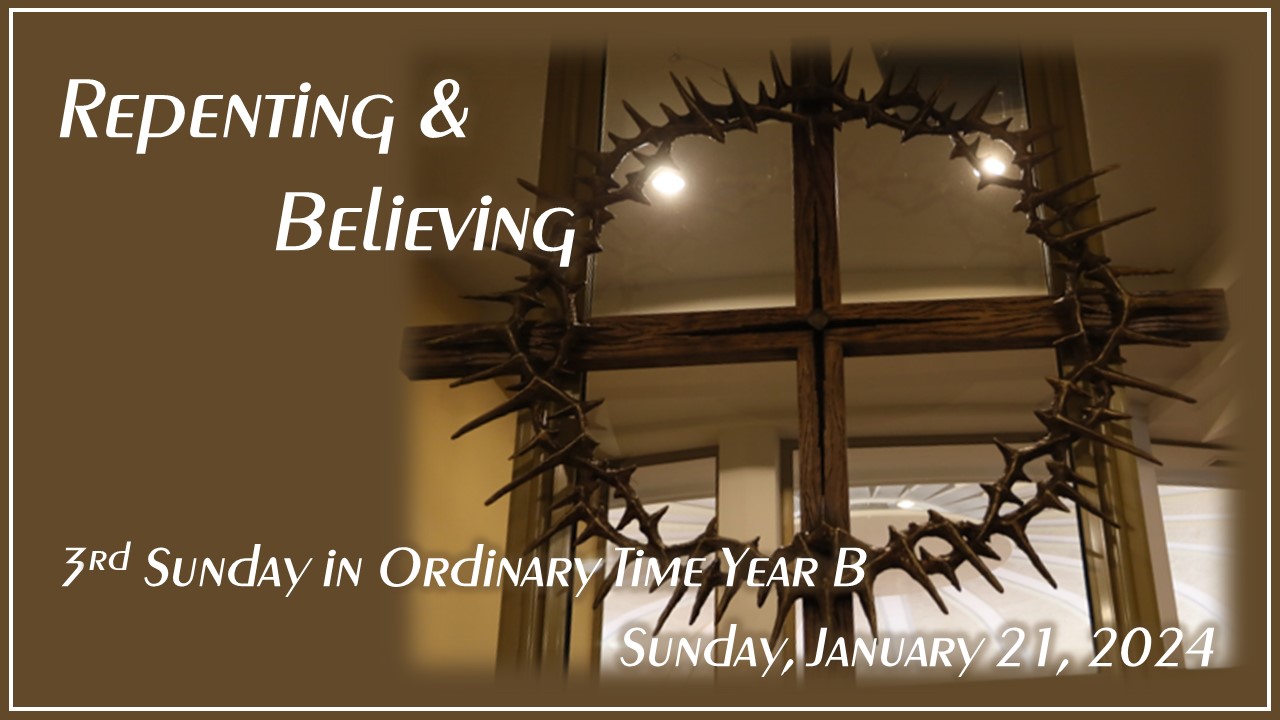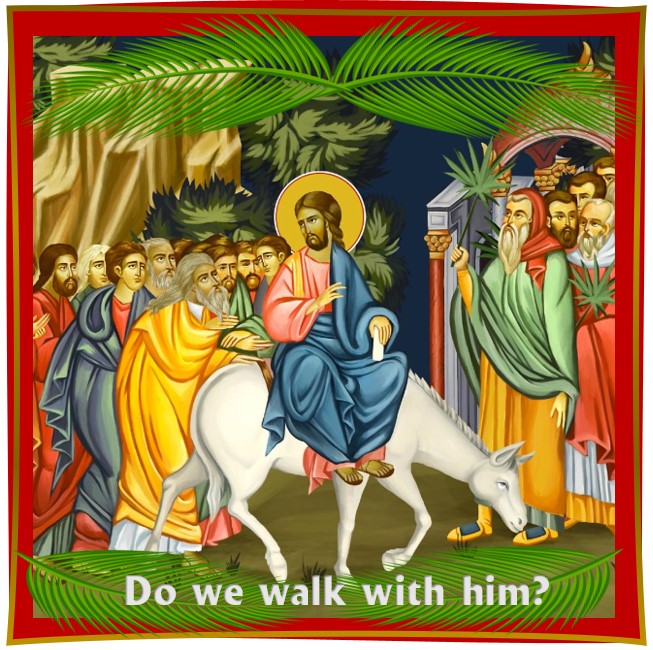
3rd Sunday of Advent Year B ~ December 17, 2023
REJOICING IN THE LORD
Today we begin the second phase or part of Advent to reflect and meditate deeply on the First coming of our Saviour “who became flesh and dwell among us” as St. John says. To be happy and joyful is the desire and wish of everyone to live a peaceful life. Today Holy Mother Church invites her children to rejoice in their Saviour who is going take human form to be with us because his is Emmanuel. The third Advent Sunday is called “Gaudete Sunday” because on this day the Mass begins with the opening antiphon: “Gaudete in Domino semper” “Rejoice in the Lord always”. In the first week of Advent, we prayed for the restoration of hope. In the second week we prayed for the gift of peace which comes from the Lord to make us stronger and stronger in our day-to-day. Today also we start second phase of Advent season which will make us to reflect on the first coming of Jesus through the prophecies of the old. This coming two weeks will have us reflect on the “O Antiphons” making us to meditate on the titles of Jesus. Let’s reflect why this Sunday is called “Gaudete Sunday”? Why do we have to rejoice early when Christmas is two weeks away? What does rejoicing mean to us amid war, violence, and divisions?
Someone described the Gaudete Sunday as follows: “Nature’s annual cycle is characterized by two phenomena, light and life. Out of the darkness of night comes light; out of death comes life. The transition from night to light characterizes the winter season; the transition from death to life is proper to summertime. The holy year of the Church is likewise divided into two phases which have similar characteristics.” Similarly, we are reminded by the Sacred Scriptures that you must rejoice in the Lord because our Salvation has come near. Someone asked St. Mother Teresa what the secret of her joy was in serving the poor and marginalized people and her answer stunned the world “Joy is a prayer — joy is a strength — joy is a love — joy is a net of love. . . A joyful heart is the normal result of a heart burning with love . . . loving as He loves, helping as He helps, giving as He gives, serving as He serves, rescuing as He rescues, being with Him twenty-four hours, touching Him in His distressing disguise.”
A speaker at a conference wanted to make a point about happiness through a group activity. So, the speaker handed out identical balloons to every attendee present. Everyone was asked to write their names on their balloon using a marker pen. All the balloons were then collected and placed in the adjacent room.
Before the conference ended, the participants were asked to head over to the room where all the balloons were. They saw the balloons scattered all over at random. The speaker then asked everyone to find their balloon. However, nobody was allowed to communicate with one another. Everyone did as was instructed but struggled to find their own balloon. People ended up bumping against each other, with some growing more frustrated by the minute. It was utter chaos.
After some time had passed, the speaker stopped everyone from searching for their balloon. They were then asked to pick up a random balloon and look for the owner of the balloon instead. The task still took a couple of minutes but eventually, everyone had their balloon in their hands. After the activity, the speaker explained the significance of the exercise.
He explained that their balloon represented happiness. And like what happened during the activity, it’ll be hard to find happiness if they look for it aimlessly. But if they allow other people to help, they stand a chance. The lesson, then is that their happiness lies in other people. And just as others can help them find their happiness, they too can help others find theirs.
The key to finding happiness is helping others find theirs and letting them find yours.
The above-mentioned story provides us the exact message which we find in the Sacred Scripture today. The first reading tells us that we should rejoice because the promised Messiah is coming as our Savior and liberator, saving us by liberating us from our bondages. The Responsorial Canticle of the day is taken from Mary’s Magnificat, in which she exclaims: “My soul glorifies the Lord, my spirit finds joy in God my Savior.”
St. John of the Cross has very deep meditation for us to have and understand the presence of God in our life. “Though holy doctors have uncovered many mysteries and wonders, and devout souls have understood them in this earthly condition of ours, yet the greater part remains to be unfolded by them, and even to be understood by them. We must then dig deeply in Christ. He is like a rich mine with many pockets containing treasures: however deep we dig we will never find their end or their limit. Indeed, in every pocket, new seams of fresh riches are discovered on all sides. For this reason, the apostle Paul said of Christ: In him are hidden all the treasures of the wisdom and knowledge of God. The soul cannot enter these treasures, nor attain them, unless it first crosses into and enters the thicket of suffering, enduring interior and exterior labors, and unless it first receives from God very many blessings in the intellect and in the senses and has undergone long spiritual training. All these are lesser things, disposing the soul for the lofty sanctuary of the knowledge of the mysteries of Christ: this is the highest wisdom attainable in this life. Might men come at last to see that it is quite impossible to reach the thicket of the riches and wisdom of God except by first entering the thicket of much suffering, in such a way that the soul finds there its consolation and desire. The soul that longs for divine wisdom chooses first, and in truth, to enter the thicket of the cross. Saint Paul therefore urges the Ephesians not to grow weary during tribulations, but to be steadfast and rooted and grounded in love, so that they may know with all the saints the breadth, the length, the height, and the depth—to know what is beyond knowledge, the love of Christ, to be filled with all the fullness of God. The gate that gives entry into these riches of his wisdom is the cross; because it is a narrow gate, while many seek the joys that can be gained through it, it is given to few with desire to pass through it”.
St. Paul, in the second reading, advises us to “rejoice always” by leading blameless, holy, and thankful lives guided by the Holy Spirit, because Christ is faithful to his promise that he will come again to reward us. In the Gospel the questions and the message of St. John the Baptist is a beautiful reminder to see the reason of the season. We need to ignore the secularism and worldly approach to this beautiful and salvific season, and we must rejoice in the Lord that “He became man and dwelt among us”.
St. Augustine reflecting on the Gospel today says “John is the voice, but the Lord is the Word who was in the beginning. John is the voice that lasts for a time; from the beginning Christ is the Word who lives for ever. Take away the word, the meaning, and what is the voice? Where there is no understanding, there is only a meaningless sound. The voice without the word strikes the ear but does not build up the heart.
However, let us observe what happens when we first seek to build up our hearts. When I think about what I am going to say, the word or message is already in my heart. When I want to speak to you, I look for a way to share with your heart what is already in mine. In my search for a way to let this message reach you, so that the word already in my heart may find a place also in yours, I use my voice to speak to you. The sound of my voice brings the meaning of the word to you and then passes away. The word which the sound has brought to you is now in your heart, and yet it is still also in mine.
When the word has been conveyed to you, does not the sound seem to say: The word ought to grow, and I should diminish? The sound of the voice has made itself heard in the service of the word, and has gone away, as though it were saying: My joy is complete. Let us hold on to the word; we must not lose the word conceived inwardly in our hearts. Do you need proof that the voice passes away, but the divine Word remains? Where is John’s baptism today? It served its purpose, and it went away. Now it is Christ’s baptism that we celebrate. It is in Christ that we all believe; we hope for salvation in him. This is the message the voice cried out.
Because it is hard to distinguish word from voice, even John himself was thought to be the Christ. The voice was thought to be the word. But the voice acknowledged what it was, anxious not to give offense to the word. I am not the Christ, he said, nor Elijah, nor the prophet. And the question came: Who are you, then? He replied: I am the voice of one crying in the wilderness: Prepare the way for the Lord.
The voice of one crying in the wilderness is the voice of one breaking the silence. Prepare the way for the Lord, he says, as though he were saying: “I speak out in order to lead him into your hearts, but he does not choose to come where I lead him unless you prepare the way for him.” To prepare the way means to pray well; it means thinking humbly of oneself. We should take our lesson from John the Baptist. He is thought to be the Christ; he declares he is not what they think. He does not take advantage of their mistake to further his own glory.
If he had said, “I am the Christ,” you can imagine how readily he would have been believed, since they believed he was the Christ even before he spoke. But he did not say it; he acknowledged what he was. He pointed out clearly who he was; he humbled himself. He saw where his salvation lay. He understood that he was a lamp, and his fear was that it might be blown out by the wind of pride.
The question of John the Baptist should be our question to examine ourselves that when we have Jesus our Reason for the Season then should we wait for someone else or …?
Now let’s reflect on the second question “Why we must rejoice so early when Christmas is two weeks away? As we celebrate this Gaudete Sunday, the reply of Jesus to St. John the Baptist sums everything “what do you see….? That’s the exact purpose of rejoicing in the Lord that he has taken all our pain and suffering on to him and died on the Cross so that we may have life and life in abundance. Christmas is two weeks away, but we need to rejoice every day in the Lord as St. Paul says “rejoice, rejoice and again I say rejoice in the Lord”.
Pope Francis reflects on this Sunday in this way “Rejoice in the Lord, means always being joyful, even when things do not go according to our wishes; but there is that profound joy, which is peace: that too is joy; it is within. And peace is a joy “at the ground level”, but it is a joy. Distress, difficulties, and suffering pass through each person’s life, we are all familiar with them; and so often the reality that surrounds us seems to be inhospitable and barren, like the desert in which the voice of John the Baptist resonated, as today’s Gospel passage recalls. But the very words of the Baptist reveal that our joy rests on a certainty, that this desert is inhabited: “among you” — he says — “stands one whom you do not know”. It refers to Jesus, the Father’s envoy who comes, as Isaiah stresses, “to bring good tidings to the afflicted; he has sent me to bind up the broken-hearted, proclaim liberty to the captives, and the opening of the prison to those who are bound; to proclaim the year of the Lord’s favour”. These words, which Jesus will speak in his discourse at the synagogue of Nazareth (Lk 4:16-19), clarify that his mission in the world consists in the liberation from sin and from the personal and social slavery that it produces. He has come to the earth to restore to mankind the dignity and freedom of the Children of God — which only he can communicate — and thereby to give joy.
A Christian’s joy is not bought; it cannot be bought. It comes from faith and from the encounter with Jesus Christ, the reason for our happiness. And when we are rooted in Christ, the closer we are to Jesus, the more we find inner peace, even among everyday contradictions. For this reason, a Christian, having encountered Jesus, cannot be a prophet of misfortune, but a witness and herald of joy. A joy to share with others; an infectious joy that renders the journey of life less toilsome.
Today as the world wrapped by the darkness of war, violence, division, and hatred as everyone is struggling to take life easy or to manage it properly the question today “why do we need to rejoice in the Lord?” becomes very important for us as Christians. We not only need ourselves to rejoice but we must create the circle of joy to help other people to believe and rejoice in the “Reason of the Season”.
Let’s reflect on this story as I conclude my reflection with one question for all of us to reflect and meditate during this week: What is my reason to rejoice?
A wealthy old man wanted to make his little boy understand the difference between being rich and being poor. So, one day, the dad took a trip with his son to the countryside where the less fortunate live and stayed there for a few days. The goal was to show his son what a poor family must endure to survive. As soon as they arrived, the kid immediately felt the difference. Nonetheless, he had no problems interacting with the locals. He played with other children and made new friends. He’d talk with the old lady who’d give him snacks. He’d walk around town and have a great time even without money in his pocket. The kid found the whole experience fascinating, to say the least. Before long, it was time to pack up and head back to the city where they lived. On the journey back, the father asked his son if he understood the difference between being rich and poor. The child began to recall everything he’s experienced and told his dad what he’s realized.
In the countryside, he could run free across fields without care. But at home, he’s confined to their backyard. In the city, you can barely see the stars at night, but that’s not a problem in the countryside. Being in the city, they must buy food every day. But the farmers he met can grow their food. But the most striking difference, he thought, was how everyone in the community cared for each other. They lived a more leisurely life compared to them. And because of that, they experience happiness daily.
The father, proud of his son, asked if he would like to be a poor man like the people he met. To his surprise, his kid shook his head and said: “No, I want to be rich like them.” Happiness is not about material wealth. It’s about the experiences that you share with others.
Do we rejoice in the Lord in the midst of uncertainties of the world?
Other Sermons In This Series

30th Sunday in Ordinary Time – Year A ~ October 29, 2023
October 27, 2023

3rd Sunday in Ordinary Time Year B ~ January 21, 2024
January 18, 2024

Palm Sunday (6th Sunday of Lent) Year A ~ March 26, 2023
March 31, 2023

